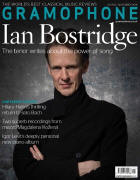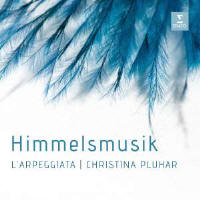Texte paru dans: / Appeared in: |
|
|
Outil de traduction (Très approximatif) |
|
|
Reviewer: Alexandra Coghlan L’Arpeggiata are the ensemble with the curl in the middle of their forehead: when they are good they are very, very good – energetic, stylish, disarmingly original – but when they are bad … There have been more bad days than good in the studio recently. Neither ‘Händel Goes Wild’ (10/17) nor ‘Music for a While’ (5/14) had much of value to say, steering away from the sly anachronisms and witty stylistic collisions of the period band’s early recordings and heading full speed towards crossover at its wilful worst. Thankfully, with ‘Himmelsmusik’ we find the group back on solid musical ground, albeit terra incognita. Italy has always been the ensemble’s musical home. Forays to Spain and South America have always led them back to Monteverdi, Cavalli, Merula and their contemporaries, while northern Europe has remained almost entirely unexplored. With ‘Himmelsmusik’ they change that, following the Italian style on its journey north to Germany in the late 17th and early 18th centuries, travelling not just from one nation to another but also from opera house to church. In a neat narrative twist the disc ends with JS Bach and the whitewashed Lutheran beauty of Komm, süsser Tod (performed with exquisite restraint by Philippe Jaroussky) – a musical destination that seems almost impossible from the vantage point of the highly perfumed, barely sacred songs by Christian Ritter, Johann Christoph Bach and Johann Rudolf Ahle that dominate the programme. Heady as the Song of Solomon (blink and you’d swear it was Poppea), these languishing love songs and laments may be directed at spiritual objects but their spirit is very much the earthly, the secular, the operatic. Jaroussky and soprano Celine Scheen divide the solo numbers between them, occasionally coming together for duets or small ensembles (deftly supported by tenor Jésus Rodil and bass Dingle Yandell). The two are well matched, and the results are wonderfully rich and unexpectedly sensual, even if Jaroussky’s vocal mannerisms – the expressive portamentos and pitchbendings – have become a little ubiquitous. Instrumental numbers have all the group’s signature lightness of touch and depth of colour, and the improvisatory freedom and sway of an anonymous Chiaccona is vintage L’Arpeggiata. |
|




